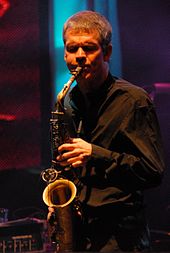Grammy Award for Best Jazz Fusion Performance
| Grammy Award for Best Jazz Fusion Performance | |
|---|---|
| A gold gramophone trophy with a plaque set on a table Gilded gramophone trophy presented to Grammy Award winners | |
| Description | quality jazz fusion performances |
| Country | United States |
| Presented by | National Academy of Recording Arts and Sciences |
| First awarded | 1980 |
| Last awarded | 1991 |
| Website | grammy.com |
The Grammy Award for Best Jazz Fusion Performance was an award presented at the Grammy Awards, a ceremony that was established in 1958 and originally called the Gramophone Awards,[1] to recording artists for works (songs or albums) containing quality jazz fusion performances. Honors in several categories are presented at the ceremony annually by the National Academy of Recording Arts and Sciences of the United States to "honor artistic achievement, technical proficiency and overall excellence in the recording industry, without regard to album sales or chart position".[2]
Originally called the Grammy Award for Best Jazz Fusion Performance, Vocal or Instrumental, the award was first presented to the jazz band Weather Report at the 22nd Grammy Awards in 1980 for the album 8:30. In 1988, the category name changed to Best Jazz Fusion Performance and was moved to a newly created Fusion field.[3] The category name was retired before the 33rd Grammy Awards (1992) with the addition of the award for Best Contemporary Jazz Performance (currently known as Best Contemporary Jazz Album).[4]
Pat Metheny holds the record for the most wins in this category, with a total of five (four times with the Pat Metheny Group). David Sanborn is the only other musician to win the award more than once, with two. The composition "Birdland" earned two musicians the award—The Manhattan Transfer won in 1981 and Quincy Jones won in 1991 for the version that appears on the compilation album Back on the Block.[5] The award went to artists or groups originating from the United States each year it was presented. Metheny also holds the record for the most nominations, with seven (including five consecutive nominations between 1981 and 1985). The group Spyro Gyra holds the record for the most nominations without a win, with six. In 1990, Terri Lyne Carrington became the first solo female artist to be nominated for the award.[6] No female artists were nominated in 1991, the final year the award was presented, making Carrington the only female solo artist to be nominated throughout the category's lifetime.
Recipients




^[I] Each year is linked to the article about the Grammy Awards held that year.
See also
References
- General
- "Past Winners Search". National Academy of Recording Arts and Sciences. Retrieved March 12, 2011. Note: User must select the "Jazz" category as the genre under the search feature.
- Specific
- ^ "Grammy Awards at a Glance". Los Angeles Times. Tribune Company. Retrieved October 10, 2010.
- ^ "Overview". National Academy of Recording Arts and Sciences. Retrieved October 10, 2010.
- ^ Browne, David (January 5, 1988). "New Grammy categories announced". Ocala Star-Banner. Ocala, Florida: The New York Times Company. Retrieved October 10, 2010.
- ^ Feather, Leonard (February 23, 1992). "Message to Grammy: A Little R-E-S-P-E-C-T, Please". Los Angeles Times. Tribune Company. p. 1. Retrieved October 12, 2010.
- ^ a b "List of Grammy Award nominations". Times-News. Hendersonville, North Carolina: The New York Times Company. January 11, 1991. p. 19. Retrieved October 10, 2010.
- ^ a b Stewart, Zan (February 18, 1990). "Grammy Voters Face Tough Jazz Choices". Los Angeles Times. Tribune Company. Retrieved March 12, 2011.
- ^ "22nd Grammy Awards". Rock on the Net. Retrieved October 12, 2010.
- ^ "Here's complete list of the Grammy nominations". Eugene Register-Guard. Eugene, Oregon: Guard Publishing. February 21, 1981. Retrieved October 12, 2010.
- ^ "Vote Grammy Awards". The Afro-American. Baltimore, Maryland. February 13, 1982. p. 10. Retrieved March 12, 2011.
- ^ "Toto Dominates Annual Grammy Nominations". Spartanburg Herald-Journal. Spartanburg, South Carolina: The New York Times Company. January 14, 1983. Retrieved October 10, 2010.
- ^ "Grammy List Dominated by Jackson". The Philadelphia Inquirer. Philadelphia Media Network. January 11, 1984.
{{cite news}}:|access-date=requires|url=(help) - ^ "Spyro Gyra İstanbul'da". Cumhuriyet (in Turkish). Mecidiyeköy, Istanbul: Cumhuriyet Foundation. October 12, 2009. Retrieved March 14, 2011.
{{cite news}}: CS1 maint: unrecognized language (link) - ^ Moser, John J. (January 27, 2011). "Yellowjackets". The Morning Call. Allentown, Pennsylvania: Tribune Company. Retrieved March 14, 2011.
- ^ "Turner, Lauper, Prince Lead Field For Grammys". South Florida Sun-Sentinel. Fort Lauderdale, Florida: Tribune Company. January 11, 1985. p. 2. Retrieved March 12, 2011.
- ^ Hunt, Dennis (January 10, 1986). "'We Are The World' Scores In Grammy Nominations". Los Angeles Times. Tribune Company. p. 4. Retrieved March 12, 2011.
- ^ Hunt, Dennis (January 9, 1987). "Grammy Nominations: Highs And Lows". Los Angeles Times. Tribune Company. p. 4. Retrieved October 12, 2010.
- ^ Hunt, Dennis (January 15, 1988). "U2, Jackson Top Grammy Nominees: Simon, Winwood Seek Reprise of '87 Wins". Los Angeles Times. Tribune Company. p. 3. Retrieved March 12, 2011.
- ^ Stewart, Zan (February 15, 1989). "Niehaus Moves From 'Bird' to 'Hot Men'; Pianist David Benoit Gets Stamp of Approval". Los Angeles Times. Tribune Company. Retrieved March 14, 2011.
External links
- Official site of the Grammy Awards
- Grammy.com: 23rd Annual Grammy Awards – Best Jazz Fusion Performance
